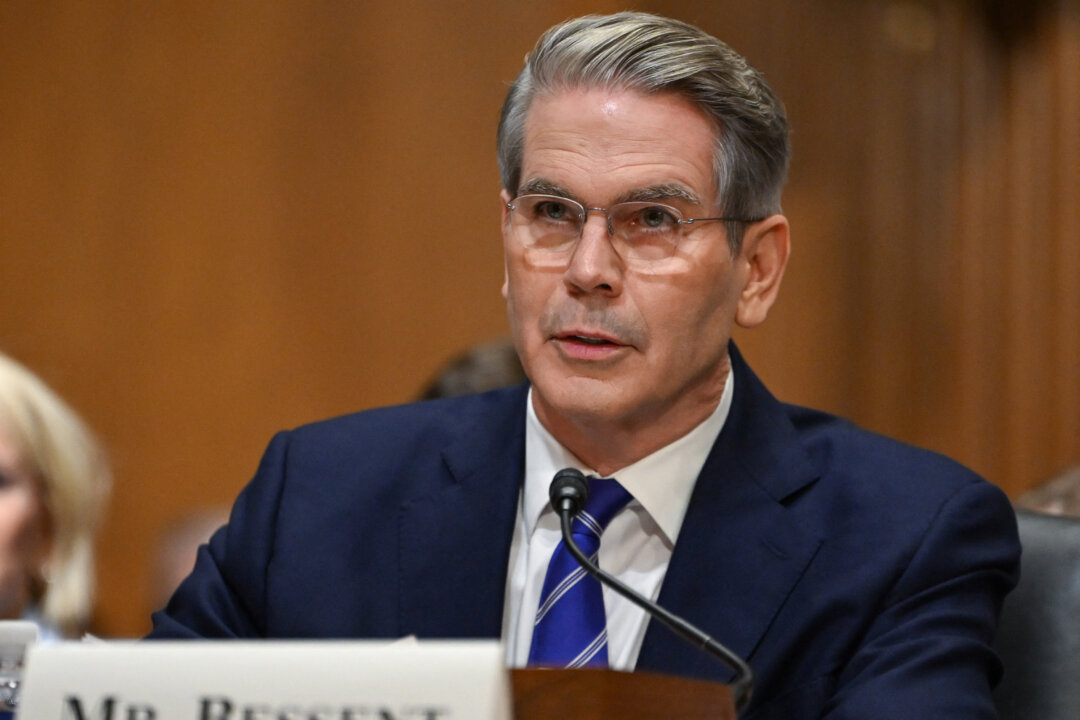Bessent emphasized that the plan would not burden Ukraine with debt or transfer Ukrainian assets to U.S. ownership.
Treasury Secretary Scott Bessent said Saturday that President Donald Trump’s proposed economic partnership with Ukraine would benefit both countries by securing U.S. taxpayer interests while fueling Ukraine’s postwar recovery, transforming the embattled country into one that is rich and stable.
In a Feb. 22 op-ed for the Financial Times, Bessent outlined the deal, in which the Ukrainian government would allocate its revenue from natural resources, infrastructure, and other assets to a fund dedicated to long-term reconstruction and development, with the United States having economic and governance rights in those future investments.
“This structure and relationship bring the high standards of transparency, accountability, corporate governance and legal frameworks necessary to attract the robust private investment for postwar growth in Ukraine,” he wrote. “The U.S.’s involvement would leave no room for corruption and insider deals.”
Bessent emphasized that the plan would not burden Ukraine with debt or transfer Ukrainian assets to U.S. ownership, distinguishing it from economic strategies used by other global actors.
“President Trump’s innovative approach represents a new model for productive international partnership. Let’s also be clear as to what this is not. The U.S. would not be taking ownership of physical assets in Ukraine. Nor would it be saddling Ukraine with more debt,” Bessent wrote, adding that the deal does not involve any “economic pressure” on Kyiv that would undermine its sovereignty.
While Bessent did not single out any specific countries, China is known for its “debt trap” diplomacy, which involves saddling countries with debt and when they can’t repay, and taking ownership of their resources or infrastructure.
“This type of economic pressure, while deployed by other global actors, would advance neither American nor Ukrainian interests,” Bessent wrote. “In order to create more value over the long term, the U.S. must be invested alongside the people of Ukraine, so that both sides are incentivized to gain as much as possible.”
Bessent said proceeds from Ukraine’s natural resources would be reinvested into key sectors that would drive economic expansion, while ensuring countries that did not support Ukraine’s defense would not profit from its reconstruction. He pointed to Poland’s post-1992 economic transformation as a model for Ukraine’s potential growth, citing structural reforms, infrastructure investment, and foreign investment as key factors in tripling Poland’s economy after its people toppled communism and embraced free markets.
“President Trump’s proposed partnership aligns the interest of the American people with those of the people of Ukraine,” Bessent continued. “The president recognizes that national security is built alongside economic security, and the more successful and secure postwar Ukraine is, the more that both the Ukrainian people and the people of the U.S. will benefit.”
Bessent said the partnership would lay the foundations for a durable peace, and reinforce Ukraine’s sovereignty and success.
Ukraine has not responded to the latest proposal.
Parliamentary Speaker Ruslan Stefanchuk told local media that a government-level group would begin working on the agreement Monday. However, Ukrainian President Volodymyr Zelenskyy previously rejected an earlier version of the proposal because it did not provide enough security guarantees, a key Kyiv demand as it seeks long-term stability free from the threat of another Russian invasion.
Zelenskyy previously indicated a willingness to reach a mineral agreement with Washington in exchange for U.S. military support. His “victory plan” explicitly includes an offer to strategic partners for “joint protection of the country’s critical resources” as well as their extraction and use. Ukraine possesses significant deposits of strategic minerals, including uranium, lithium, cobalt, and rare earth elements, which are critical for batteries, technology, and aerospace applications.
Trump on Saturday reiterated his determination to broker a peace agreement between Russia and Ukraine. Speaking at this year’s Conservative Political Action Conference (CPAC), held in suburban Maryland, Trump said he believes the war in Ukraine will soon come to an end.
“I’ve spoken to President Putin, and I think that thing is going to end. It’s got to end,” he said. “It’s a horrible, horrible thing to watch. I’m dealing with President Zelensky. I’m dealing with President Putin.
“I’m going to try and get the war settled, and I’m going to try and get all that death ended,” Trump said.
On Friday, Trump said that the deal was “pretty close” to being finalized, while White House press secretary Karoline Leavitt said Saturday that the president is “going to be working around the clock all weekend to get a deal and end this conflict in Ukraine.”

